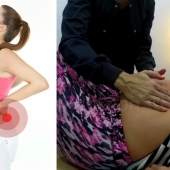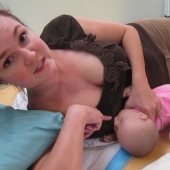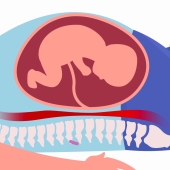If you're pregnant or a new mom, congratulations to you and your growing family, but listen up, because we have some information on a rare and dangerous blood clotting disorder that's important for anyone diagnosed with it, but most of all, for you expectant moms out there. Joining me to talk about this is maternal-fetal medicine specialist, Dr. Christopher Robinson. Good morning doctor, thank you for joining me.
So, let's talk about this blood clotting disorder. What is it?
You know, I think a lot of people, when they think of blood clotting, we think of a good thing. We think of, for instance, I cut myself, I stopped bleeding, and that's great. It's awesome. The problem is, there are some people who actually clot too easily. In other words, they actually have clots that can put their lives at danger, and the specific clotting disorder we're going to talk about today is the anti-thrombin 3 deficiency. It's a hereditary type of blood clotting. And so it's important to recognize that it's very different than the clotting that we think about in our everyday lives.
Yes, because when I think of clotting, I'm not thinking so something so dangerous. So, how rare is this?
It is a rare condition, but not as rare as people think. In other words, we believe there's probably around 60,000-600,000 people in the United States that have this condition. We believe that probably only a fraction of those individuals actually know they have the disorder.
And where is the danger behind it?
This scenario is dangerous because it predisposes a woman who is going through the most special time of her life, she's in pregnancy, she's planning her family, she's planning for a healthy baby, she's looking to the future. She wants to ensure she does everything to get there, but at the same time, she has this deficiency in her blood that causes her to clot spontaneously. It can happen in her arteries. It can happen in her veins.
And the risk with that is?
Well, the worst case scenarios is that clot sets up on one of those vessels and actually moves into her lungs, preventing her from getting adequate oxygen, and placing her life at risk, as well as her baby. Unfortunately, that event is not 100% predictable, so we can't actually tell her when it's going to happen, or how it's going to happen, but these women are at very elevated risk. In fact, 70% of women who have this deficiency in pregnancy will develop a clot, and they can have a life-threatening event in that pregnancy.
Now, you mention, doctor, that it's inherited. So, are there signs that someone can look for, maybe in terms of maybe recognizing that they could have this?
That's important. So, since it's inherited, it means we have to look at our whole family. We have to step back and not only think about ourselves, but think about what happened to my mother, what happened to my father, do I have sisters? The family tree. Exactly. We need to look at everyone in the family. Have we had individuals with early heart disease? Have we had other individuals that have had these clots? Maybe they've happened in their leg, maybe they had clots that went to their lungs, sometimes called a pulmonary embolus. That caused them to be admitted to the hospital. Maybe we have individuals in our family who are taking blood thinners. We call those anti-coagulants in medicine, but what we hear them called in our family is maybe grandfather, or maybe my sister or brother, is on a blood thinner. A blood thinner is there to protect that person from these types of clots. The question is, what caused their clot? and understanding why did this person have this event in the first place.
Now, the good news, and I know I have to toss to a break right now, but there is a blood test that one can get to determine if they have this, correct?
There is. There's a reliable blood test. It's a blood test that's accessible really across the United States, and across the world, to find out if a person has this disorder.
Dr. Robertson, let's continue the conversation here and talk about why this condition is not only dangerous, but especially dangerous when you are pregnant.
First of all, pregnancy is a very special time in a woman's life. She's planning for the normal. She's planning for her future family. She's anticipating a healthy child, a healthy delivery, and really we're not focused on the complications, but we know that sometimes complications do creep in to these scenarios. We do things in obstetrics to try to elicit this information, to try to find out, is there a risk in this family? For instance, we might ask a woman, do you have any family history of things like blood clots. We may refer to terms like thrombophilia, meaning that a person clots too easily. We may ask those questions. Sometimes patients don't actually know. They don't know the answer to that. They may not know their family history completely. As we talked about before, it's important to dig in the family history to find out if there's a history of thrombophilia, or is there a history of a hereditary type of blood clotting, and very importantly, this type of blood clotting, hereditary anti-thrombin 3 deficiency is particularly dangerous in pregnancy.
So, I can only imagine for a woman who is hearing that they're expecting a child, and of course that's a wonderful and exciting moment, but nerve wracking as well, and this diagnosis, it's got to be tough.
It's challenging any time we have to give a person information that could potentially suggest they are at risk. It changes their perception. It changes their feelings. It induces, sometimes, feelings of just being frightened or scared of the actual event. One of our jobs is to try to alleviate that, to make a plan, to make a plan to minimize the risk of a thrombophilia upon that pregnancy. To minimize the risk of clotting too easily, and in the case of anti-thrombin 3 deficiency, it's very important to know if this deficiency exists in the patient so that we can make a plan for how to care for that pregnancy.
And you can make a plan, and here's the good news, because you can reduce the risks of blood clots. What are they?
Absolutely. When we look at these women who have hereditary anti-thrombin 3 deficiency. We're talking about women who have low amounts of this protein, anti-thrombin 3. So, the reason they're clotting is not just accidental. It's occurring because they have a deficiency of something that normal people have enough of, and that protein is important in balancing clotting versus anticoagulation. If you don't have enough of that protein, you're more likely to clot. In fact, as that protein gets lower and lower, you're clotting risk is going higher and higher.
So, the key is we have the ability to donate this molecule, this anti-thrombin 3, we can get it off of the shelf from other patients, and give it to a patient to replace their ability to prevent clots, to keep them in a normal balance that they should have in pregnancy, and thus protect their pregnancy, as well as their outcome for that pregnancy.
Doctor, I know you're very passionate about this, and especially about raising awareness about this disorder, and even letting people know that their are resources out there.
There are many resources a person can go to. For instance, ClotConnect.org and it's actually put out by physicians, and it actually gives you reliable information on how to diagnose a condition like this, how to look at your family history, and what things we would do to respond, so it gives you information. When you go in, talking to your physician should be a two-way discussion. You should be providing information, they should be providing you information, and you should both make a plan together, and that's the most important thing we do.
So, to really sum this up, the most important thing is to recognize first of all that this is anti-thrombin deficiency. This is a very special type of clotting disorder that really places a person at a very different degree of risk than the other clotting disorders. I think the second thing is to really take a hard look at one's family history to see is there anything in my family that might suggest that I am at risk for this. Things like recurrent miscarriage, previous clots in family members, early cardiac disease, and then talk to your doctor, because there is a test, and there's treatment, so there's things can be done for this condition
- 28 views













